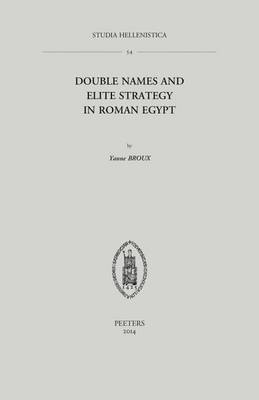Studia Hellenistica
1 primary work
Volume 54
In this detailed study of double names in Egypt, Yanne Broux explores
how the age-old tradition of polyonymy flourished under Roman rule.
While in the Ptolemaic period double names were mainly bilingual and
were thus connected to the concept of ethnicity, they underwent a
significant change starting around the middle of the first century AD
and culminating in the third. Broux argues that this shift from
Ptolemaic Greek-Egyptian to Roman Greek-Greek double names was the
outcome of two structures introduced by the Romans: the strict social
hierarchy on the one hand, and the municipalization of the
metropoleis, which led to the rise of the local elite, on the
other. This resulted in a strong emphasis on Greek identity and descent,
and double names lent themselves exceptionally well for this purpose.
They bring to the fore the importance that the local elite attached to
Greek identity and descent, and, perhaps, as a wink to the (forbidden?)
tria nomina, provided a means to distinguish their prominent
bearers from the rest of the Egyptian population.
how the age-old tradition of polyonymy flourished under Roman rule.
While in the Ptolemaic period double names were mainly bilingual and
were thus connected to the concept of ethnicity, they underwent a
significant change starting around the middle of the first century AD
and culminating in the third. Broux argues that this shift from
Ptolemaic Greek-Egyptian to Roman Greek-Greek double names was the
outcome of two structures introduced by the Romans: the strict social
hierarchy on the one hand, and the municipalization of the
metropoleis, which led to the rise of the local elite, on the
other. This resulted in a strong emphasis on Greek identity and descent,
and double names lent themselves exceptionally well for this purpose.
They bring to the fore the importance that the local elite attached to
Greek identity and descent, and, perhaps, as a wink to the (forbidden?)
tria nomina, provided a means to distinguish their prominent
bearers from the rest of the Egyptian population.
